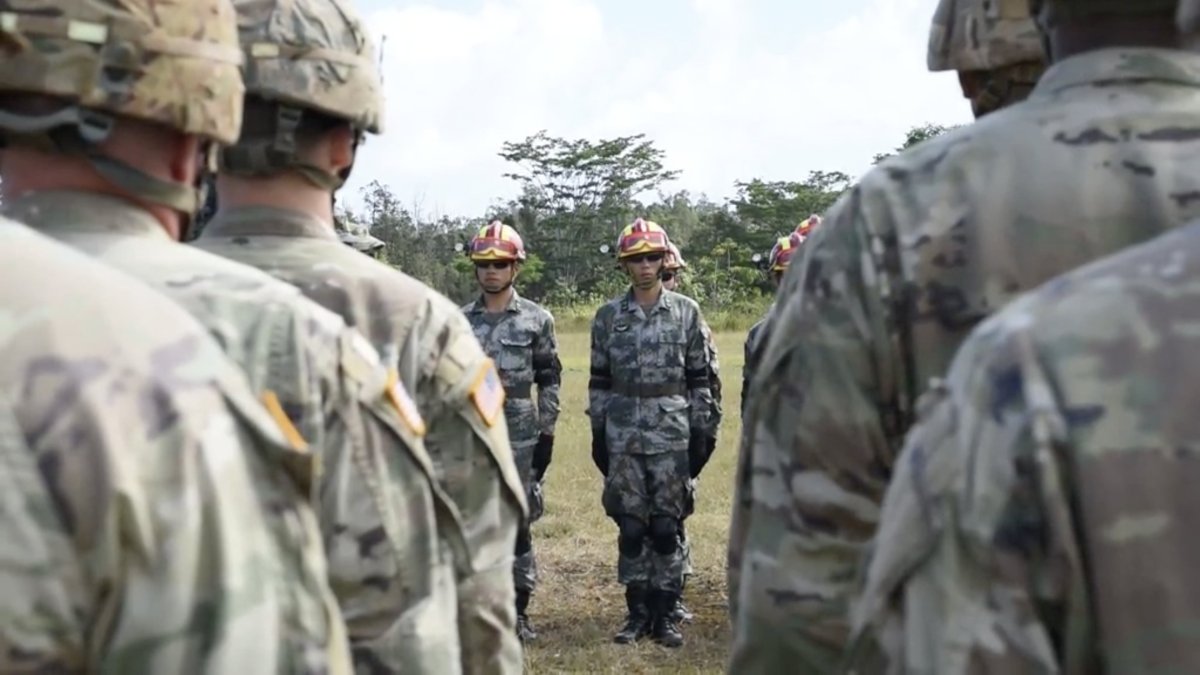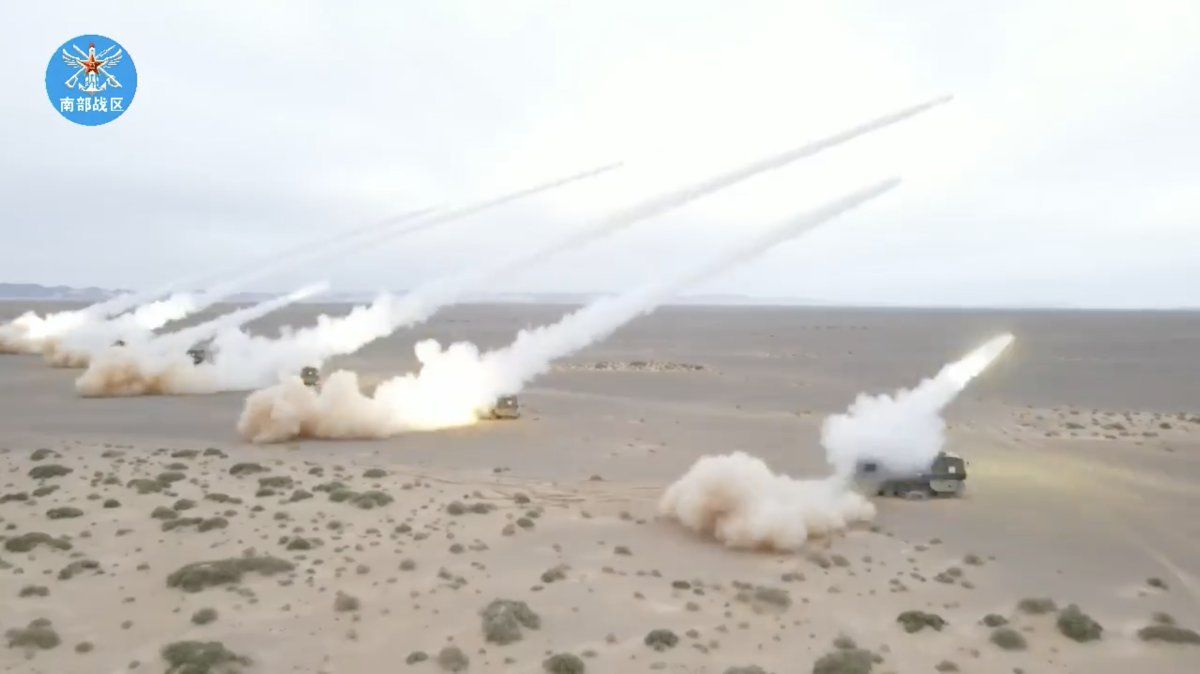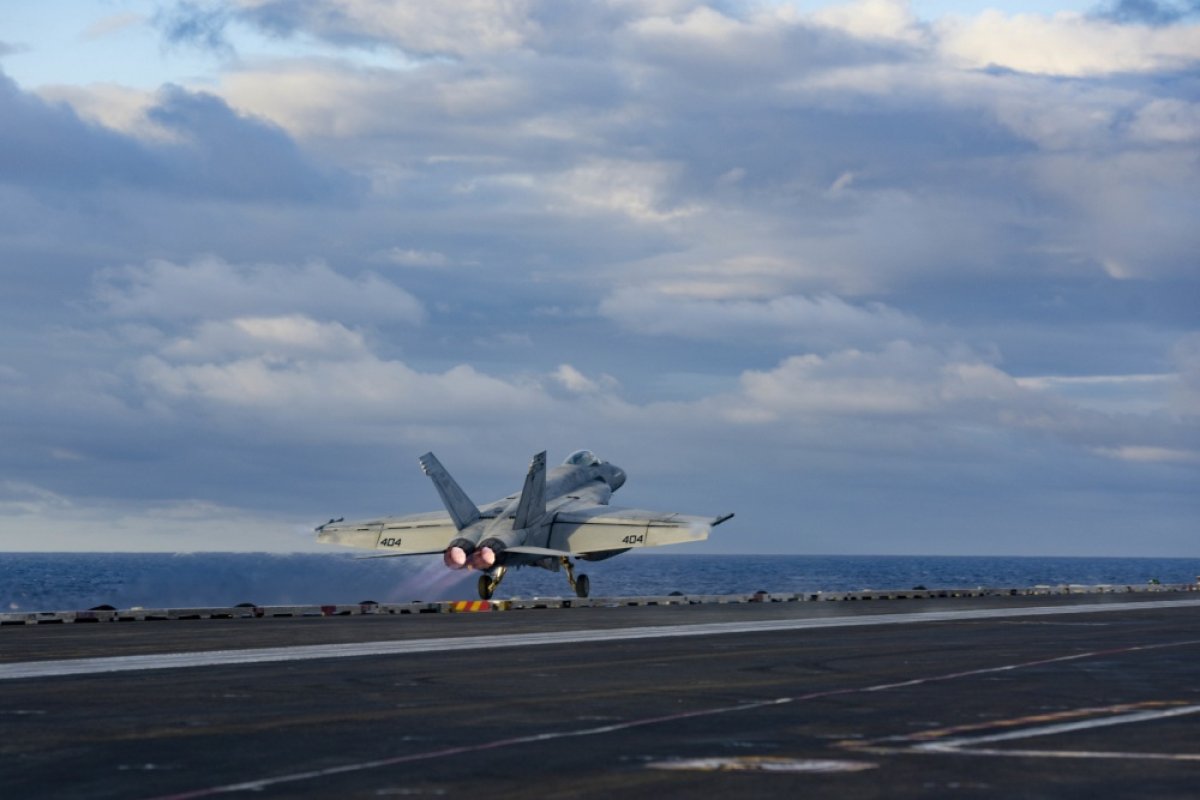The armed forces of the United States and China held a joint meeting to discuss how they would maintain communications in the event of a crisis, the first such interaction of its kind that takes as the two countries continue to trade warnings just days before the U.S. presidential election.
The Pentagon announced Thursday that representatives from the U.S. Defense Secretary's Office, the Joint Staff and the Indo-Pacific Command met virtually with members of China's Central Military Commission's Office for International Military Cooperation, its Joint Staff Department and the People's Liberation Army Southern Theater Command to convene the first-ever Crisis Communications Working Group, a two-day event that began Wednesday.
The goal, the statement said, was "to build mutual understanding" between the two rivals based "on principles to prevent and manage crisis and reduce risk to forces."
"The two sides agreed on the importance of establishing mechanisms for timely communication during a crisis," the statement said, "as well as the need to maintain regular communication channels to prevent crisis and conduct post-crisis assessment."
The meeting was also discussed Thursday by the Chinese Defense Ministry, where spokesperson Senior Colonel Wu Qian emphasized the importance of improving the beleaguered ties between the two nations, something he said Beijing was willing to work toward.
"China is willing to continue to uphold the principles of non-conflict, non-confrontation, mutual respect, win-win cooperation and strive to promote the development of China-U.S. relations on the track of coordination, cooperation and stability," Wu told reporters in Beijing.
He hoped the Pentagon would follow suit.
"It is hoped that the U.S. and China will meet halfway, reduce hostility, refrain from provocations, strengthen communication, manage risks and play a constructive role in the stable development of relations between the two militaries," Wu added.
And while he announced further interactions planned throughout the rest of the year, he also issued a sharp warning in response to unspecified U.S. media reports that President Donald Trump's administration could conduct MQ-9 Reaper drones against China-controlled islands in the South China Sea in an effort to influence the election in the incumbent's favor.
Wu said he had assurances from the Pentagon that such a scenario was not in the works, but warned: "Should anyone dare to stir up a conflict on the sea, the Chinese side will fight back resolutely to safeguard its national sovereignty and security interests."

Wu also echoed Chinese Foreign Ministry spokesperson Wang Wenbin's criticism the day before in his comments regarding U.S. Defense Secretary Mark Esper's remarks emphasizing joint efforts with India to counter China during a recent bilateral ministerial meeting in New Delhi. Wu called it part of a "Cold War mentality and zero-sum game concept."
The U.S. signed the latest of several defense deals with India, the only fellow member of the Quadrilateral Security Dialogue without a formal alliance with Washington. The other member states are Australia and Japan; they, along with India, are all locked in worsening tensions with China.
The four countries are set to hold naval drills together for the first time under the framework of next month's Malabar naval exercises.
Esper has designated China and Russia the Pentagon's "primary competitors" and has sought to align nations against them in moves that have driven Beijing and Moscow closer together.
In his own press conference Thursday, Wang defended China on the diplomatic front. He blasted U.S. Secretary of State Mike Pompeo for alleging "infiltration" of U.S. society by the Chinese Communist Party's United Front Work Department and designating the National Association for China's Peaceful Unification as a foreign mission.
"We advise Pompeo and his like to stop making lies and sabotaging Sino-U.S. relations, and not to go further and further down the wrong path," Wang said.
In his own remarks Wednesday, however, the top U.S. diplomat said the State Department's moves help "move us a step closer toward a relationship with the PRC based on transparency and reciprocity."
U.S. Navy Secretary Kenneth Braithwaite took his rhetoric a step further.
"I think [China] is probably the greatest threat to our country that Americans, writ large, do not understand," Braithwaite said during a Navy Memorial event Wednesday, according to Military.com. "... I literally believe with all my heart and soul -- and I can't stress this any more -- what we are seeing emerging is a threat beyond any comparison ever in the history of our country."
The Trump administration has launched a comprehensive campaign to rethink Washington's relationship with Beijing, which the White House accuses of a range of abuses in the realms of trade, human rights and territorial disputes in Asia. The temperature has especially been high around Taiwan, a self-ruling island claimed by the Chinese mainland since their de facto division at the end of a civil war in 1949.
Washington switched its recognition from Taipei—heading Taiwan, officially known as the Republic of China—to Beijing, leading the People's republic China—decades ago, but the Trump administration has expanded informal ties. Among the most controversial aspects of this unofficial relationship with Taiwan, is U.S. military assistance.
The State Department has approved four major arms sales for Taiwan, the latest being Harpoon Coastal Defense Systems designed to repel the kind of invasion the People's Liberation Army has been continually training for.
Chinese President Xi Jinping has vowed to reunify Taiwan with the mainland by force if necessary. The Chinese leader has already expanded the central government's authority over Hong Kong, a former colony of the United Kingdom granted partial autonomy since a 1997 handover.

Pompeo announced his condemnation Thursday over the detention of three Hong Kong activists, arguing that the "Beijing-controlled Hong Kong government continues to stifle dissent, repress public opinion, and use law enforcement for political purposes."
The Trump administration has most directly challenged Beijing's regional claims by conducting an increasing number of "freedom of navigation" operations both through the Taiwan Strait and the waters of the South China Sea. Here, China has established a growing military presence across islands claimed by other countries.
Pompeo accused China of "lawless and threatening behavior" in this resource-rich region, calling out what he described as the "PLA's illegal militarization of the South China Sea" during remarks delivered to reporters in Sri Lanka on Wednesday.
In a conversation with Newsweek, a Pentagon spokesperson revealed that, from January through August, the U.S. has conducted eight freedom of navigation operations "challenging China's excessive maritime claims" in the region.
"All of our operations are designed to be conducted in accordance with international law and demonstrate that the United States will fly, sail, and operate wherever international law allows," the spokesperson said at the time, "regardless of the location of excessive maritime claims and regardless of current events."

Uncommon Knowledge
Newsweek is committed to challenging conventional wisdom and finding connections in the search for common ground.
Newsweek is committed to challenging conventional wisdom and finding connections in the search for common ground.
About the writer
Based in his hometown of Staten Island, New York City, Tom O'Connor is an award-winning Senior Writer of Foreign Policy ... Read more
To read how Newsweek uses AI as a newsroom tool, Click here.








